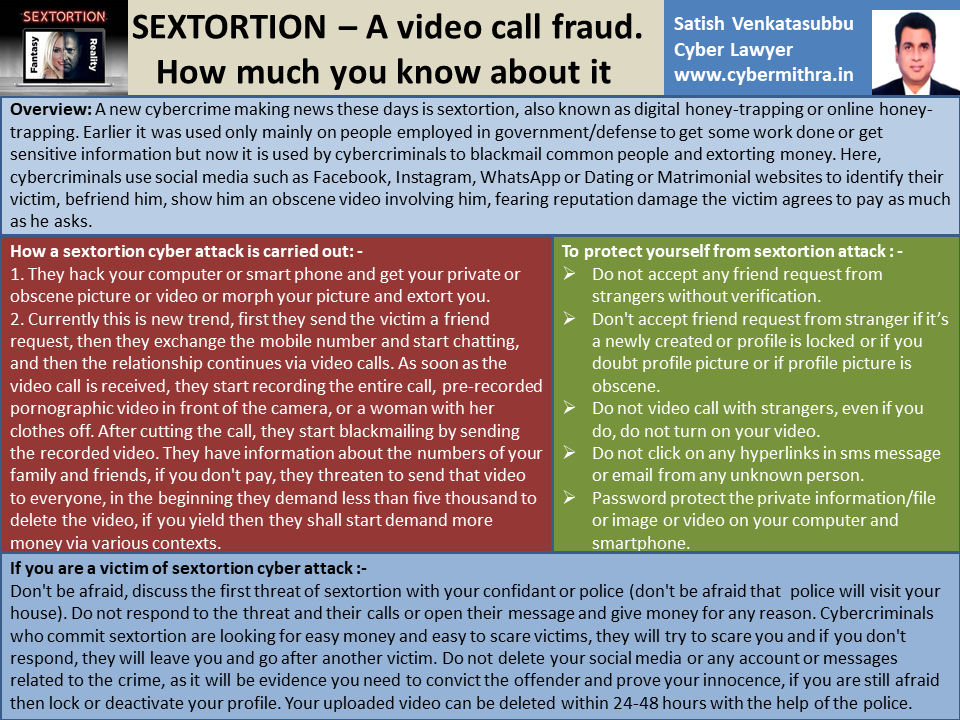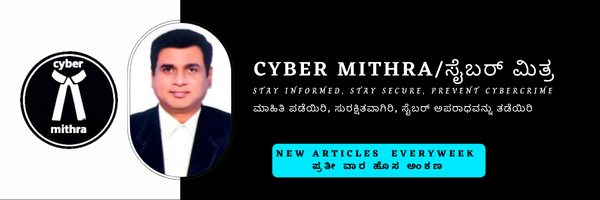SEXTORTION – A video call fraud, how much you know about it?
A new cybercrime making news these days is sextortion, also known as digital honey-trapping or online honey-trapping. Earlier it was used only mainly on people employed in government/defense to get some work done or get sensitive information but now it is used by cybercriminals to blackmail common people and extorting money. Here, cybercriminals use social media such as Facebook, Instagram, WhatsApp or Dating or Matrimonial websites to identify their victim, befriend him, show him an obscene video involving him, fearing reputation damage the victim agrees to pay as much as he asks.
How sextortion is carried out :-
1. Hack your computer or smart phone and get your private or obscene picture or video or morph your picture and extort you.
2. Currently this is new trend, first they send the victim a friend request, then they exchange the mobile number and start chatting, and then the relationship continues via video calls. As soon as the video call is received, they start recording the entire call, pre-recorded pornographic video in front of the camera, or a woman with her clothes off. After cutting the call, they start blackmailing by sending the recorded video. They have information about the numbers of your family and friends, if you don’t pay, they threaten to send that video to everyone, in the beginning they demand less than five thousand to delete the video, if you yield then they shall start demand more money via various contexts.
To protect yourself from this sextortion attacks:-
- Do not accept any friend request from strangers without verification.
- Don’t accept friend request from stranger if it’s a newly created or profile is locked or if you doubt profile picture or if profile picture is obscene.
- Do not video call with strangers, even if you do, do not turn on your video.
- Do not click on any hyperlinks in sms message or email from any unknown person.
- Keep your computer’s camera taped or blocked when not in use.
- Password protect the private information/file or image or video on your computer and smartphone.
- Monitor your kids online activity and inform them of the dangers of social media and accepting stranger’s invite.
If you are a victim of sextortion cyber attack :-
Don’t be afraid, discuss the first threat of sextortion with your confidant or police (don’t be afraid that police will visit your house). Do not respond to the threat and their calls or open their message and give money for any reason. Cybercriminals who commit sextortion are looking for easy money and easy to scare victims, they will try to scare you and if you don’t respond, they will leave you and go after another victim. Do not delete your social media or any account or messages related to the crime, as it will be evidence you need to convict the offender and prove your innocence, if you are still afraid then lock or deactivate your profile. Your uploaded video can be deleted within 24-48 hours with the help of the police.
Indian Laws on Sextortion fraud :-
Sextortion is a punishable offence by law and attracts section 354 (D), 506 / 507, 509 IPC and 384 #ipc, and Sec.67 of #ITact2000 is also applicable.
Section 108(1)(i)(a) of the Criminal Procedure Code #crpc empowers the victim to call the magistrate of her locality and inform him/her about the person whom she believes could circulate any obscene matter. The magistrate has the power to detain such person(s) and can order him to sign a bond to stop him from circulating the material. This might deter the accused. This is a quick remedial section because the victim can lodge the complaint with the magistrate without any direct evidence against the accused.
Section 292 of the Indian Penal Code (#IPC) incriminates any person who distributes or threatens to disperse any intimate and compromising images of someone through any electronic means, including apps and other social media.
If a picture of woman is clicked in an obscene manner without her knowledge and is distributed, a voyeurism case under Section 354C of the IPC can also be filed along with the aid of other relevant sections from the Information Technology Act.
References :-
1. https://cyber.delhipolice.gov.in/Sextortion.html
2. https://cyber.delhipolice.gov.in/FaceBookfriendship.html
3. https://zeenews.india.com/india/mathura-is-ups-jamtara-for-sextortion-shocking-details-2559225.html
4. https://infosecawareness.in/concept/police/beware-of-online-sextortion


